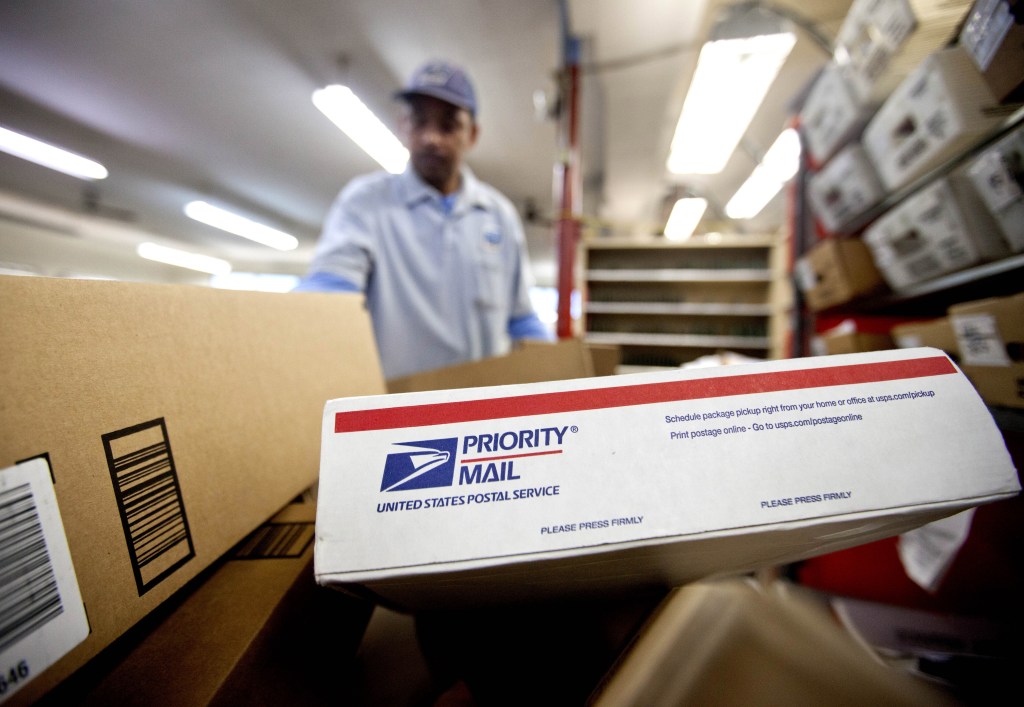WASHINGTON — The U.S. Postal Service said Friday it lost $5 billion over the past year, and postal officials again urged Congress to pass legislation to help the beleaguered agency solve its financial woes.
In a positive sign, the loss was a fraction of the record $15.9 billion the Postal Service reported losing last year. But it was still the agency’s seventh straight annual loss and came despite its first growth in revenue since 2008.
Operating revenue rose 1.2 percent to $66 billion, thanks to growth in the post office’s package delivery business and higher volume in standard mail. That was not enough to offset long-term losses in first class mail — the post office’s most profitable service — where revenues declined by 2.4 percent.
“We’ve achieved some excellent results for the year in terms of innovations, revenue gains and cost reductions, but without major legislative changes, we cannot overcome the limitations of our inflexible business model,” Postmaster General Patrick Donahoe said.
The Postal Service has struggled for years with declining mail volume, but the lion’s share of its financial plight stems from a 2006 congressional requirement that it make annual $5.6 billion payments to cover expected health care costs for future retirees. It has defaulted on three of those payments.
Postal officials have been pressing Congress to let the agency end Saturday mail delivery and reduce the payments for retiree health benefits. But prospects for a legislative fix are increasingly unlikely this year.
“The lack of action is simply unfair to customers and employees and all the stakeholders that depend on a healthy postal service,” Donahoe said.
The Postal Service also has asked for an emergency rate hike in the cost of a first-class stamp from 46 to 49 cents. That request must be approved by the independent Postal Regulatory Commission.
Donahoe said the postal service saved $1 billion over the past year by consolidating 143 mail processing centers, eliminating 1,400 delivery routes and modifying retail hours in more than 7,000 post offices. It has also reduced its career workforce by 37,400 through attrition.
Fredric Rolando, president of the National Association of Letter Carriers, one of the Postal Service’s largest unions, suggested the agency would have had an operating profit of $600 million if it did not have to pay the congressionally mandated $5.6 billion charge for pre-funding future retiree health benefits. Rolando urged lawmakers to reject any bills “that focus on slashing service and attacking postal employees and instead focus on fixing the pre-funding fiasco.”
Earlier this week, the agency announced a lucrative deal with retail giant Amazon to begin package delivery on Sunday. While growing Internet use has shrunk the volume of first class mail dramatically, the rise of online shopping has been a boon to the postal service’s package delivery business.
Revenue from package services rose by $923 million, or 8 percent, last year and shipping and package services now represent 16 percent of the agency’s revenues.
The Postal Service is an independent agency that does not depend on tax money for its operations but is subject to congressional control.
Send questions/comments to the editors.



Success. Please wait for the page to reload. If the page does not reload within 5 seconds, please refresh the page.
Enter your email and password to access comments.
Hi, to comment on stories you must . This profile is in addition to your subscription and website login.
Already have a commenting profile? .
Invalid username/password.
Please check your email to confirm and complete your registration.
Only subscribers are eligible to post comments. Please subscribe or login first for digital access. Here’s why.
Use the form below to reset your password. When you've submitted your account email, we will send an email with a reset code.